Should Endangered Astronauts Get Last Chance To Say
Goodbye?
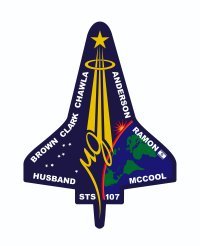 It's the kind of question that comes up only after
the bruised emotions begin to heal - only after time provides us
some distance from a tragedy in space. It's an ethical question.
Hopefully, prayerfully, it's a question we'll never have to ask
again.
It's the kind of question that comes up only after
the bruised emotions begin to heal - only after time provides us
some distance from a tragedy in space. It's an ethical question.
Hopefully, prayerfully, it's a question we'll never have to ask
again.
But...
Should astronauts who know the chances are they won't return
safely to Earth make a final call to their loved ones - to say
goodbye?
"Ummmmm, talk about being uncomfortable," says Milt Heflin, head
of the flight director's office at Johnson Space Center, in an
interview with the Associated Press. Seems, even after Apollo 13,
Challenger and Columbia, there is no NASA policy on this. But it's
a question that seems to be coming to a head.
Flight Surgeons Vs. Techies
Long before Columbia broke up re-entering Earth's atmosphere,
NASA flight surgeons have been pushing for some sort of policy on
this question. But the space agency has yet to come up with one, as
flight directors, technicians and administrators say they want more
time to think it over.
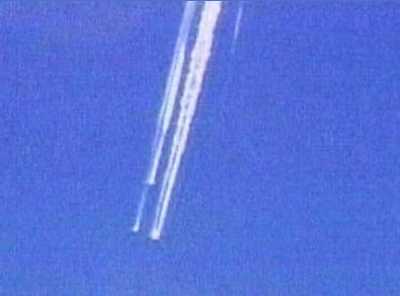
It's a pertinent question, given the now-constant human presence
in space aboard the International Space Station. "You have to raise
people's consciousness," says Flight Surgeon Terry Taddeo. "I can't
imagine any other way of doing it than having an event like this,
for better or worse. People have to be taking it more seriously
now."
The Bigger Question
The last-call debate brings up an even trickier question. NASA
and Boeing engineers knew 82 seconds into the STS-107 mission that
there might be trouble brewing on the Columbia's left wing. Clearly
shown in launch surveillance pictures, a chunk of insulating foam
broke off the external fuel tank and smashed into the leading edge
and underside of the wing. For more than a week, NASA and
contractor teams debated about the significance of the impact and
whether it would make a difference upon re-entry. In the end, they
declined an offer from the National Reconnaisance Office to inspect
the wing with spy satellites, declared the possibility of damage
negligible and, according to one former astronaut, soft-peddled the
issue when talking to the seven astronauts aboard STS-107.
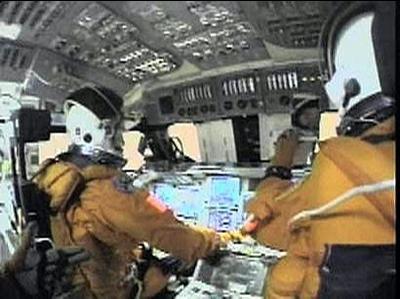
Sen. Bill Nelson (D-FL), who flew aboard Columbia just days
before the 1986 Challenger tragedy, accused NASA of leaving a
valuable resource out of the loop in trying to decide how badly the
space plane's wing was damaged by the foam debris and whether it
could cause problems upon re-entry. Nelson chastised NASA
Administrator Sean O'Keefe during a Senate hearing earlier this
month.
"To cut the crew out, you're eliminating a great resource,"
Nelson said.
Dr. J.D. Polk, a NASA flight surgeon, agreed. "We're talking
about a lot of Ph.D.s and doctors and people with master's in
aerospace and people with a lot of operational knowledge of the
vehicle. We might have been able to think of something," Polk says.
"Plus I think the crew would probably want time to talk to the
families and get things squared away in their minds and with their
families, as to how the family is going to continue on."
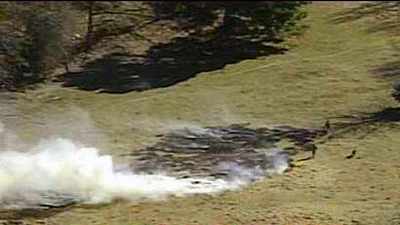
A Fateful Discussion
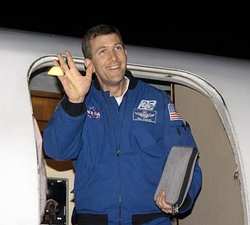 This discussion moved from the theoretical to the
realm of reality just before seven astronauts aboard Columbia
lifted off from the Kennedy Space Center on its penultimate mission
last year. The AP reports all seven talked about what would happen
if space junk punctured the shuttle's fuel tanks and they became
stuck in space, a situation portrayed in the 1969 movie,
"Marooned," starring Gregory Peck and Gene Hackman. They talked
about what they'd try to do to rectify the situation. They talked
about a last goodbye with their loved ones. That was Columbia's
next-to-last mission, commanded by astronaut Scott Altman. He says
he'd have wanted to know the whole story. And, he says, he
certainly have wanted a chance to say goodbye to his family.
This discussion moved from the theoretical to the
realm of reality just before seven astronauts aboard Columbia
lifted off from the Kennedy Space Center on its penultimate mission
last year. The AP reports all seven talked about what would happen
if space junk punctured the shuttle's fuel tanks and they became
stuck in space, a situation portrayed in the 1969 movie,
"Marooned," starring Gregory Peck and Gene Hackman. They talked
about what they'd try to do to rectify the situation. They talked
about a last goodbye with their loved ones. That was Columbia's
next-to-last mission, commanded by astronaut Scott Altman. He says
he'd have wanted to know the whole story. And, he says, he
certainly have wanted a chance to say goodbye to his family.
But other astronauts aren't so sure. "I don't know, I don't
know," said NASA's only female shuttle commander, Eileen Collins,
when asked by the AP if she'd want to say goodbye to her husband
and two young children.
In the case of STS-107, Evelyn Husband, widow of the shuttle's
commander, Rick Husband above, right), says she in no way wanted to
know days before that the Columbia, with her husband on board, was
doomed. "We would have gone through days of absolute agony with the
crew and the families as well as the nation," Mrs. Husband says,
adding that "God was very merciful in this situation. They were on
their way home, 16 minutes away from landing, feeling incredibly
happy at the job well done. We were on the ground waiting for them,
feeling the very same way," she told the AP. "For anything
different, I think, would be absolutely horrible. We have the rest
of our lives to deal with their loss. But to know it a day, two
days, a few moments beforehand, would have not added one bit to
this experience. It would have made it worse."
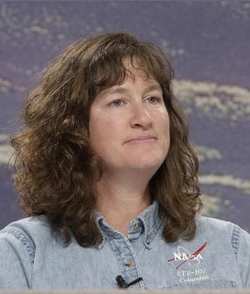 As to whether the crew should have been better
informed about the possible damage to Columbia's left wing, NASA
Flight Surgeon Dr. Jon Clark, whose wife Laurel was killed in the
Feb. 1 disaster, said "From the families that I've talked to, the
perspective we have is that we were all very glad the crew did not
detract from the mission to try and work a problem they would have
never been able to fix anyway."
As to whether the crew should have been better
informed about the possible damage to Columbia's left wing, NASA
Flight Surgeon Dr. Jon Clark, whose wife Laurel was killed in the
Feb. 1 disaster, said "From the families that I've talked to, the
perspective we have is that we were all very glad the crew did not
detract from the mission to try and work a problem they would have
never been able to fix anyway."
Instead of dwelling on what he would have said had there been a
last goodbye with Laurel (right), Dr. Clark says he thinks about
the last images salvaged from the wreckage of Columbia strewn
across southern Texas and Louisiana - images showing the astronauts
happy, anxious to come home and unaware that fate would deal them a
cruel and fatal blow within minutes. "Each time I watch it, I get a
sense of joy to know they were just having such a great time."
 Aero-News: Quote of the Day (12.09.25)
Aero-News: Quote of the Day (12.09.25) ANN's Daily Aero-Term (12.09.25): High Speed Taxiway
ANN's Daily Aero-Term (12.09.25): High Speed Taxiway ANN's Daily Aero-Linx (12.09.25)
ANN's Daily Aero-Linx (12.09.25) NTSB Final Report: Diamond Aircraft Ind Inc DA20C1 (A1); Robinson Helicopter R44
NTSB Final Report: Diamond Aircraft Ind Inc DA20C1 (A1); Robinson Helicopter R44 ANN FAQ: Q&A 101
ANN FAQ: Q&A 101








